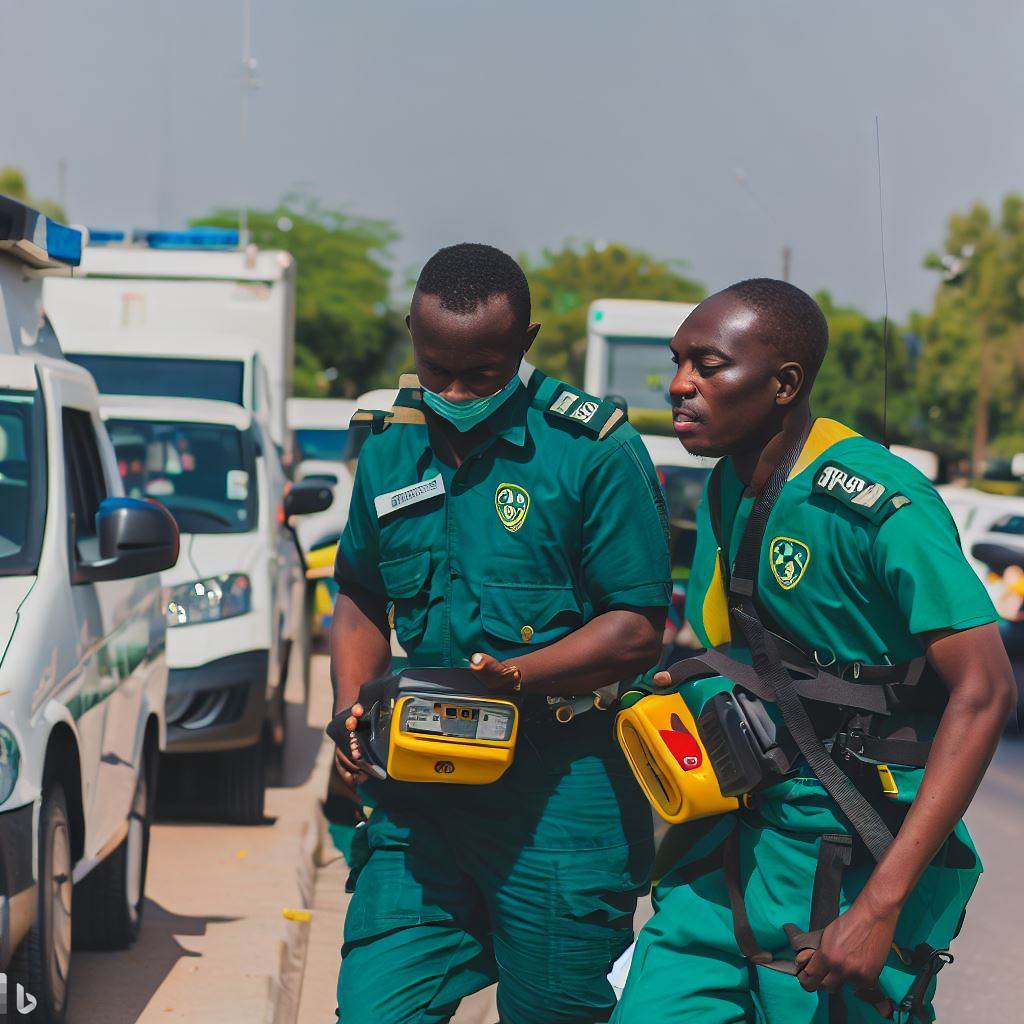Introduction
In times of crises, paramedics emerge as unsung heroes, racing against time to provide crucial medical aid. Their rapid response, expert assessment, and proficient medical skills can often be the difference between life and death.
Paramedics possess the expertise to stabilize patients on-site, administer life-saving interventions, and ensure a safe transition to medical facilities.
Nigeria’s paramedics hold a unique position within the nation’s healthcare fabric. With a growing population and diverse challenges, understanding their role and capabilities is paramount.
By delving into the world of Nigeria’s paramedics, we uncover the following:
- Critical Role: Paramedics serve as the frontline of emergency medical care, extending critical aid where it’s needed most.
- Challenges: Overcoming resource limitations, navigating traffic, and managing high-pressure situations pose constant challenges.
- Training and Expertise: Rigorous training equips paramedics with skills for rapid assessment and effective medical interventions.
- Collaboration: Paramedics work closely with hospitals, police, and fire departments to ensure seamless emergency response.
Exploring Nigeria’s paramedics offers insights into their dedication, sacrifices, and the essential role they play in safeguarding lives. As we unravel the layers of their responsibilities and challenges, a deeper appreciation for their indispensable contributions emerges.
Through this exploration, we acknowledge the dedication of Nigeria’s paramedics and the immense impact they make during times of crisis.
Overview of Nigeria’s healthcare system
Brief explanation of Nigeria’s healthcare infrastructure
Nigeria’s healthcare system comprises both public and private sectors, with the government being the major provider of healthcare services.
The infrastructure includes primary healthcare centers, general hospitals, teaching hospitals, and specialized healthcare facilities.
The primary healthcare centers, located in rural and urban areas, serve as the first point of contact for patients.
They offer basic medical services, preventive care, and health education to the population. These centers play a crucial role in promoting community health and preventing diseases.
General hospitals are spread across the country and provide a range of healthcare services, including emergency care, surgery, internal medicine, pediatric care, and obstetrics and gynecology.
These hospitals serve as referral centers for primary healthcare centers. Teaching hospitals are tertiary healthcare facilities attached to medical universities.
They provide specialized care, advanced medical procedures, and medical education and research opportunities for medical students and professionals.
Specialized healthcare facilities focus on specific fields such as cancer treatment, mental health, pediatric care, and infectious diseases.
They have highly trained healthcare professionals and advanced medical equipment to address specific health concerns.
Challenges faced by the healthcare system in Nigeria
Despite some progress, Nigeria’s healthcare system faces numerous challenges that hinder its efficiency and effectiveness. Here are some notable challenges:
- Inadequate funding: The healthcare sector in Nigeria receives insufficient funding both from the government and individuals.
This results in limited resources, inadequate infrastructure, and a shortage of healthcare professionals. - Lack of access to healthcare services: Many Nigerians, especially those in rural areas, struggle to access basic healthcare services due to the limited number of healthcare facilities.
Transportation problems and long distances act as barriers to receiving timely medical care. - Shortage of healthcare professionals: Nigeria faces a shortage of doctors, nurses, and other healthcare professionals.
This shortage is further exacerbated by brain drain, where qualified professionals seek better opportunities abroad. - Poor healthcare infrastructure: Many healthcare facilities in Nigeria lack proper infrastructure, including medical equipment, drugs, and facilities for electricity and water supply.
This affects the quality of care provided and further discourages healthcare professionals from working in these conditions. - Limited health insurance coverage: The majority of Nigerians do not have health insurance, making healthcare services unaffordable for many.
This leads to a reliance on out-of-pocket payments, causing financial strain for individuals and families. - High burden of infectious diseases: Nigeria faces a high burden of infectious diseases, including malaria, tuberculosis, HIV/AIDS, and vaccine-preventable diseases.
These diseases pose significant challenges to the healthcare system and require adequate resources to control and manage effectively. - Inequitable distribution of healthcare services: Healthcare services are disproportionately concentrated in urban areas, leaving rural communities underserved.
This inequality in distribution further widens the healthcare gap between different regions and socioeconomic groups.
Addressing these challenges and strengthening Nigeria’s healthcare system requires a multi-faceted approach involving increased investment in healthcare infrastructure, improved healthcare financing, retention of healthcare professionals, expansion of health insurance coverage, and prioritization of preventive healthcare measures.
By enhancing the healthcare system, Nigeria can better respond to emergencies and ensure the well-being of its population.
Read: Combating Emergency Challenges: Nigerian Paramedics at Work
Role of paramedics in Nigeria’s healthcare system
Definition of paramedics and their training
Paramedics are highly trained medical professionals who provide emergency medical care. They undergo specialized training in advanced medical procedures and skills.
Their training includes courses on assessing patients, administering medications, and performing lifesaving procedures.
Paramedics are equipped to handle various medical emergencies and provide immediate medical assistance.
Types of emergencies where paramedics are involved
Paramedics play a crucial role in responding to road accidents and providing first aid to injured individuals.
They are involved in medical emergencies such as heart attacks, strokes, and respiratory distress. Paramedics provide assistance during natural disasters like earthquakes, floods, and outbreaks.
They also support childbirth and provide emergency care for pregnant women.
Importance of quick response and timely action
Paramedics are often the first healthcare providers to arrive at the scene of an emergency. Quick response and timely action by paramedics can significantly increase the chances of survival.
They stabilize patients and provide critical care while transporting them to medical facilities. Paramedics administer life-saving interventions, such as CPR and defibrillation, to individuals with cardiac emergencies.
Their prompt actions can prevent further complications and improve patient outcomes.
Timely administration of medications and interventions by paramedics can reduce disability and long-term health issues.
Paramedics also play a role in educating the public on emergency preparedness and basic first aid. They raise awareness about the importance of calling for emergency medical assistance promptly.
In the end, paramedics are an indispensable asset in Nigeria’s healthcare system. They undergo specialized training to provide emergency medical care, ensuring quick response and timely action.
Paramedics are involved in various emergencies, including road accidents, critical medical conditions, and natural disasters.
Their role in stabilizing patients, administering lifesaving procedures, and providing immediate medical assistance cannot be undermined.
The prompt actions of paramedics can significantly increase survival rates and prevent long-term complications.
It is crucial to recognize the importance of paramedics in saving lives and support their continuous training and development.
Read: Volunteerism and Its Role in Nigerian Paramedicine
Challenges faced by Nigeria’s paramedics
Lack of resources and equipment
Paramedics in Nigeria often face the challenge of working with limited resources and inadequate equipment.
The lack of ambulances, medical supplies, and basic life-saving equipment hampers their ability to provide effective emergency care.
Without proper resources, paramedics struggle to deliver timely and appropriate care to patients in critical condition.
In many cases, paramedics have to rely on improvised solutions, further compromising the quality of emergency medical services.
Limited access to advanced medical training and technology
Nigeria’s paramedics face obstacles in accessing advanced medical training and keeping up with evolving practices.
Due to the limited availability of specialized training programs, paramedics often lack the necessary skills to handle complex cases.
The absence of regular updates on medical advances and technologies hinders their ability to deliver optimal care.
Paramedics in Nigeria need better access to training institutions and resources that can equip them with the latest medical knowledge.
High demand and workload
With a population of over 200 million people, Nigeria places a heavy demand on its paramedics. Paramedics often work long hours and are constantly on-call, leading to physical and mental exhaustion.
Limited staffing and a high workload create challenges in providing prompt emergency response to all cases.
The high demand for their services sometimes forces paramedics to make difficult decisions about prioritizing patients.
In fact, Nigeria’s paramedics face several challenges that hinder their effectiveness in emergency care.
The lack of resources and equipment, limited access to advanced medical training and technology, and the high demand and workload place significant burdens on paramedics.
It is essential for the government and healthcare authorities to address these challenges by allocating more resources, improving training programs, and enhancing infrastructure.
By supporting and empowering Nigeria’s paramedics, we can ensure that they continue to be an indispensable asset during emergencies and provide quality care to those in need.
Read: A Day in the Life of a Nigerian Paramedic: Personal Stories
Success stories and impact of Nigeria’s paramedics
Notable cases where paramedics played a crucial role
- Paramedics successfully resuscitated a heart attack victim in Lagos, saving his life.
- A pregnant woman in Abuja received emergency care from paramedics and safely delivered her baby.
- Paramedics assisted in a major accident on a highway, providing immediate medical attention to multiple injured individuals.
- In a remote village, paramedics reached in time and saved a child from a snake bite.
- A gunshot victim received crucial pre-hospital care from paramedics, which proved instrumental in his survival.
Improved survival rates and positive impact on communities
Paramedics have significantly increased survival rates in emergency cases across Nigeria. The availability of skilled paramedics has reduced mortality rates, especially in remote areas.
Communities feel more secure knowing that paramedics are readily available in times of crises. Paramedics provide immediate medical care that stabilizes patients before they reach hospitals.
Paramedics play a vital role in preventing worsening of injuries and medical conditions. The positive impact of paramedics extends beyond emergencies, fostering a sense of safety and trust in communities.
Recognition of paramedics’ contributions
Paramedics in Nigeria are gaining recognition and appreciation for their invaluable services. Government authorities and medical organizations have acknowledged the vital role of paramedics.
Paramedics are being honored for their dedication, competence, and professionalism. Efforts are being made to improve the training, equipment, and support available to paramedics.
More individuals are aspiring to become paramedics, encouraged by the recognition and impact of the profession.
In essence, the success stories and impact of Nigeria’s paramedics are undeniable.
Not only have they played crucial roles in saving lives during emergencies, but they have also improved survival rates and positively impacted communities.
The recognition of their contributions by government authorities and medical organizations highlights the importance of their work.
With continued support, training, and resources, Nigeria’s paramedics will continue to be an indispensable asset in emergencies, ensuring the well-being and safety of the Nigerian population.
Read: The Impact of COVID-19 on Paramedics in Nigeria

Government and Community Support for Paramedics
Efforts made by the Nigerian government to improve emergency response
The Nigerian government has implemented various initiatives to enhance emergency response systems. They have increased funding for training programs and equipment for paramedics.
Government agencies have also established specialized units to handle emergency situations.
Paramedics are provided with advanced medical tools and technology to aid in their work. The government has created policies and guidelines to regulate the practice of paramedics.
Importance of community engagement and awareness
- Community involvement is crucial in supporting the work of paramedics.
- Public education programs raise awareness about emergency response procedures.
- Citizens are encouraged to learn basic first aid and CPR to assist in emergencies.
- Communities play a vital role in reporting emergencies promptly and providing accurate information.
- By working together, paramedics and the community can save more lives during emergencies.
Collaboration with NGOs and International Organizations
Partnerships with NGOs strengthen emergency response efforts, providing resources, funding, and training for paramedics. International organizations offer technical expertise to improve response systems.
Collaborations expand paramedic services’ reach and effectiveness, ensuring better care for those in need.
Nigerian paramedics play a critical role in saving lives during emergencies. Government support and community engagement enhance their effectiveness.
The government implements initiatives to strengthen paramedic services, increasing funding for training and specialized units to handle emergencies efficiently.
Advanced medical tools aid paramedics in their life-saving efforts. These efforts significantly improve emergency response in Nigeria.
Public education programs create awareness about response procedures, encouraging prompt reporting and accurate information provision during emergencies.
Citizens learning first aid and CPR provide immediate assistance before paramedics arrive. Collaborative efforts between communities and paramedics save more lives during emergencies.
Partnerships with NGOs and international organizations further strengthen Nigeria’s paramedic services, providing additional resources and expertise.
Their support expands the reach and effectiveness of emergency response efforts, ensuring quality care.
In summary, government support and community engagement are pivotal in enhancing Nigeria’s paramedic services.
Increased funding, specialized units, and advanced medical tools strengthen the overall response to emergencies.
Public education programs and citizen involvement empower communities to actively participate in emergency response.
Collaborations with NGOs and international organizations bring additional resources and expertise, making Nigerian paramedics indispensable assets in saving lives.
Read: The Journey to Becoming a Registered Nurse in Nigeria
Find Out More: Nigeria’s Top Schools for Aspiring Lab Technicians
Steps to further strengthen Nigeria’s paramedic services.
Investment in training and resources
- Increase funding to provide comprehensive training programs for paramedics.
- Equip paramedics with adequate medical supplies, equipment, and ambulances.
- Establish specialized training centers to cater to the specific needs of paramedics.
- Collaborate with international organizations to access advanced training resources.
- Offer scholarships and incentives to attract more individuals to pursue a career as paramedics.
Importance of regular evaluations and quality assurance
- Implement a robust system of regular evaluations for paramedic services.
- Ensure regular inspections to assess the readiness and preparedness of paramedics.
- Establish quality assurance teams to monitor the performance of paramedic units.
- Encourage ongoing professional development to enhance paramedics’ skills and knowledge.
Encouraging partnerships and knowledge exchange
- Foster collaboration between paramedic services and other healthcare providers.
- Facilitate knowledge exchange programs with international paramedic organizations.
- Establish networks and forums to share best practices and lessons learned.
- Encourage research and innovation within the paramedic field.
- Engage community organizations to improve awareness and understanding of paramedic services.
Nigeria’s paramedics play a crucial role in providing essential emergency medical care, and strengthening their services is imperative.
Firstly, increased funding for paramedic training programs would ensure comprehensive education for aspiring paramedics.
Equipping them with adequate medical supplies, equipment, and ambulances is essential.
Specialized training centers catering to paramedic needs would enhance their skills. Collaboration with international organizations can provide access to advanced training resources.
Offering scholarships and incentives would attract more individuals to pursue a paramedic career, addressing workforce shortages.
Regular evaluations and quality assurance are vital. Implementing a robust evaluation system, including inspections and audits, would assess readiness and performance.
Quality assurance teams dedicated to monitoring paramedic units would maintain high standards of care.
Encouraging ongoing professional development opportunities keeps paramedics updated with medical advancements.
Partnerships and knowledge exchange with healthcare providers improve the emergency response system.
Facilitating knowledge exchange programs with international organizations allows learning from global best practices.
Establishing networks and forums to share best practices enhances the quality of care.
Encouraging research and innovation drives continuous improvement and evidence-based practices.
Engaging community organizations in promoting awareness of paramedic services is crucial for increased support and trust.
To sum up, strengthening Nigeria’s paramedic services involves investing in training and resources, conducting regular evaluations, fostering partnerships, and promoting awareness.
These strategies ensure timely and effective emergency responses in the country.
Conclusion
Recap of the significance of Nigeria’s paramedics in emergencies
Nigeria’s paramedics play a crucial role in saving lives during emergencies. They are highly skilled professionals who provide immediate medical assistance to those in need.
They are the first responders who stabilize patients, administer life-saving treatments, and transport them to hospitals for further care. Without their expertise, many lives would be lost.
Call to action for continued support and recognition of paramedics
It is essential to support and recognize the efforts of Nigeria’s paramedics. They require appropriate training, equipment, and resources to perform their duties effectively.
Funding should be allocated to improve the infrastructure and facilities for emergency medical services. This will enhance response times and overall effectiveness in saving lives.
Final thoughts on the invaluable role played by Nigeria’s paramedics in saving lives
Nigeria’s paramedics are an invaluable asset in emergencies. Their dedication, bravery, and quick thinking make a significant difference in critical situations.
Every life they save is a testament to their skill and commitment. Therefore, it is crucial to recognize and appreciate their contributions to society.
By supporting and understanding the importance of Nigeria’s paramedics, we can ensure that they continue to be a vital lifeline during emergencies, ultimately saving more lives.




